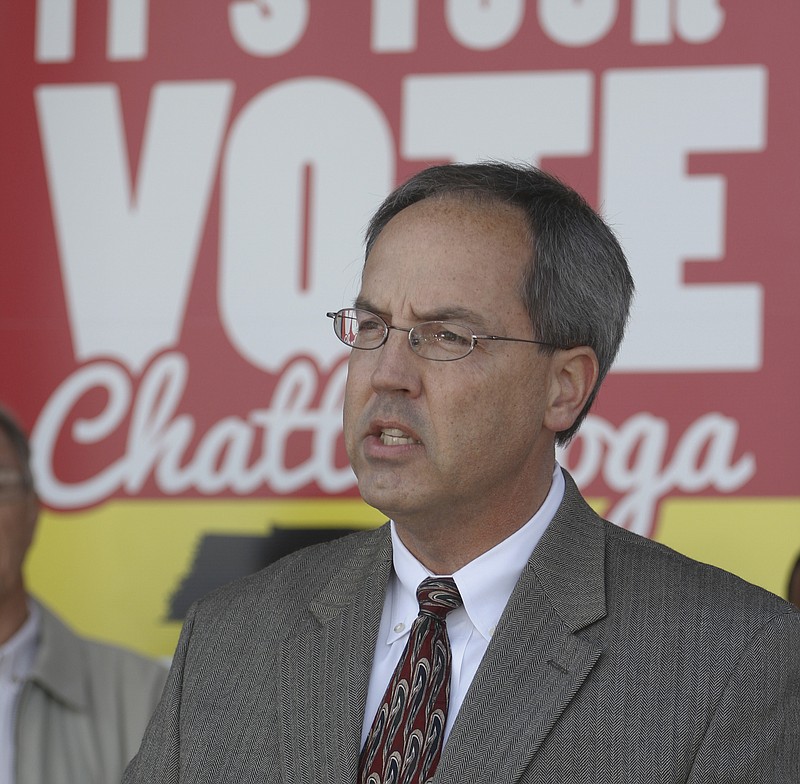These days it's popular to call oneself a "fiscal conservative." In fact, it's so hip today in Hamilton County that we have a county mayor embracing fiscal conservatism while accusing a majority of the "fiscally conservative" county commissioners of being "fiscally irresponsible."
So who is right?
First, let me define a fiscal conservative as an elected official who is fiscally responsible with the taxpayer funds that have been entrusted to him or her, knowing that a government's revenue comes from the taxes it collects. Fiscal conservatives exemplify the principles of transparency and accountability and seek to keep taxes low.
Recent headlines have revealed a public spat between Hamilton County Mayor Jim Coppinger and several Hamilton County commissioners. The issue that has garnered their intense debate along with significant ire from taxpayers has been whether the commissioners will continue to dole out $900,000 annually ($100,000 per commissioner) in "discretionary" funds to projects of their choice. This program has been in place for years, and when Mayor Coppinger was a commissioner, he supported it.
As a fiscal conservative myself, I have personally struggled with this program. First, regardless of one's commitment to honesty and integrity, there is always the temptation to use one's position to influence others for personal benefit.
I know each of the nine commissioners personally. They are all fine individuals, and I do not question their integrity. But human nature is consistent. We are all broken, and given the proper set of circumstances, we can all stumble and compromise our core values. Thus, it's critical that we all maintain checks and balances to ensure those values are never sacrificed. This truth is even more pronounced for those in leadership.
Second, our county just wrapped up a public discussion over whether to raise taxes to address some needs in our schools. The debate highlighted the growing pressure our elected officials are under to balance the budget without a tax increase. While the county rejected a tax increase that was earmarked "for the children," commissioners embraced a $1 million discretionary program that has lost the confidence of taxpayers, despite the good it does.
Third, as the discretionary funds program currently functions, transparency and accountability are lacking. True, there are supposedly no backroom deals and the use of the funds is public. But the way in which the program currently operates results in most taxpayers being left out of the debate.
It's unlikely that taxpayers will be aware of how their commissioners spend the funds given the reality that the funds are doled out many times throughout the year. Multiply this reality by nine commissioners, and you can see it's practically impossible for taxpayers to hold their commissioners accountable.
Once the funds are spent, transparency and accountability have little impact on the process.
In place of the current system, I recently proposed one potential solution to some of our elected officials. Limit the distribution of the funds by all commissioners to once a year and require each commissioner to publicly identify his plans for the funds. Announce the proposed spending for all nine commissioners in the media so the public can weigh in. This would compress the current year-long haphazard process into a one-month highly transparent and accountable deliberation.
Mayor Coppinger should be commended for his effort to balance the budget without a tax increase as should the commissioners for their desire to continue to fund worthwhile projects in their respective districts.
However, if there is one thing I am continuing to learn, it is that politics involves the art of compromise on issues that do not involve one's core values. I don't doubt the fiscally conservative bonafides of the mayor or the commissioners who challenged the mayor's budget.
But was there no middle ground?
Reducing the fund from $900,000 to $450,000 would have shown a willingness by both parties to recognize the validity of each side.
In closing, leaving this matter "as is" fails the public interest, diminishes taxpayers' confidence in their government and embraces the status quo.
So will the real fiscal conservative stand and lead us to a fiscally conservative solution?
Mark D. West is president of the Chattanooga Tea Party.
